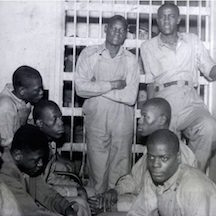 In 1931, nine African American teenagers were accused of raping two White women on a train. The defendants were apprehended in Alabama and were tried, convicted, and sentenced to death in Scottsboro, Alabama. The case was appealed and dragged on for many years. During the appeals processes, one of the women who had claimed to have been raped recanted her story and said she had never been touched by the defendants. However, the guilty verdicts were upheld.
In 1931, nine African American teenagers were accused of raping two White women on a train. The defendants were apprehended in Alabama and were tried, convicted, and sentenced to death in Scottsboro, Alabama. The case was appealed and dragged on for many years. During the appeals processes, one of the women who had claimed to have been raped recanted her story and said she had never been touched by the defendants. However, the guilty verdicts were upheld.
The case was heard by the U.S. Supreme Court twice. One case resulted in a decision that ruled African American were entitled to competent legal representation and the other required that Blacks be included in jury pools. Four convictions were eventually overturned, but seven of the original nine served time in prison. By 1989 all of the defendants were dead. But it was not until 2013 that the state of Alabama granted pardons to the Scottsboro Boys. The case was fully detailed in Professor Dan T. Carter’s book Scottsboro: A Tragedy of the American South (Louisiana State University Press, 1969).
Now the University of Alabama has established a new online archive about the case. The archive, “To See Justice Done: Letters from the Scottsboro Trials,” includes thousands of letters, documents, petitions, and telegrams that were sent to Alabama governors during the legal proceedings.
Ellen Spears, an associate professor of American studies at the University of Alabama, notes that “these archival materials show the breadth and depth of the demand for justice that was coming from all across the country and around the world. They provide an extraordinary primary resource for students and scholars of African American history and social justice.”











